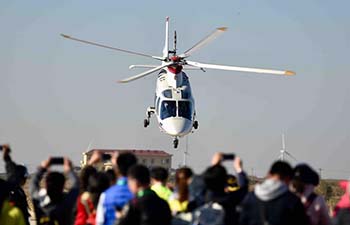ANAHEIM, the United States, Nov. 11 (Xinhua) -- Compared to women, men are more likely to receive bystander CPR in public locations, and they are more likely to survive after the life-saving measure, according to preliminary research presented at the American Heart Association (AHA) Scientific Sessions 2017 start Saturday in Anaheim, California.
"We're only beginning to understand how to deliver CPR in public, although it's been around for 50 years," Benjamin Abella, the study's senior author and director of Penn's Center for Resuscitation Science, was quoted as saying in a news release. "Our work highlights the fact that there's still so much to learn about who learns CPR, who delivers CPR and how best to train people to respond to emergencies."
According to the AHA, over 350,000 out-of-hospital cardiac arrests occur in the United States each year and almost 90 percent of people who suffer out-of-hospital cardiac arrests die. Statistics prove that if more people knew CPR, more lives could be saved. CPR, especially if performed in the first few minutes of cardiac arrest, can double or triple a person's chance of survival.
Using data from the Resuscitation Outcomes Consortium, a network of regional clinical centers in the United States and Canada studying out-of-hospital treatments of cardiac arrest and trauma, researchers analyzed 19,331 cardiac events at home and in public.
The research found that men were 1.23 times more likely to receive bystander CPR in public settings and they had 23 percent increased odds of survival compared to women.
"CPR involves pushing on the chest so that could make people less certain whether they can or should do CPR in public on women," said Audrey Blewer, the study's first author and assistant director for educational programs at the Center for Resuscitation Science at the University of Pennsylvania in Philadelphia.
These findings identify a gap in bystander CPR delivery that can help improve future messaging and training to lay responders, health care providers and dispatchers, according to researchers.
AHA's Scientific Sessions, a premier global exchange of the latest advances in cardiovascular science for researchers and clinicians, attracts nearly 18,000 attendees, with a global presence from more than 100 countries. In addition, two million medical professionals participate virtually in lectures and discussions about basic, translational, clinical and population science.

















